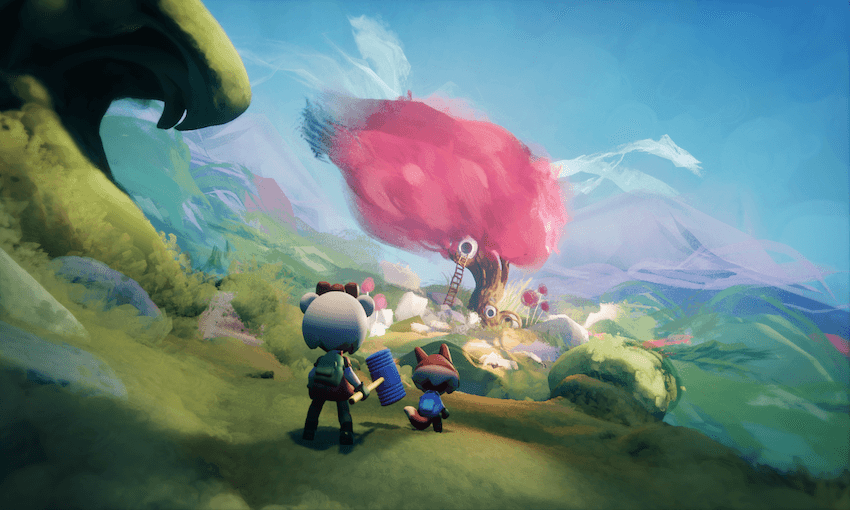The Spinoff’s Blighty correspondent Hayden Donnell meets some UK game developers to find out why the US gaming industry might be better off shifting operations to the Motherland.
Silicon Valley has given us a few good things. Windows 95. The time Bill Gates drank poo water. Atari. The TV show Silicon Valley. It’s not all bad.
But those achievements have come at a big cost. Over the years, the tech hub has been poisoned by its outsized reputation for innovation, slowly morphing into a safe harbour for insufferable walking-TED-talks who spend their time churning out groundbreaking inventions such as the bus, flatting, and squeezing. Its leaders and luminaries are a cohort of alleged aliens who we’ve endowed with apocalyptic power, billionaire geniuses who can’t figure out basic workers’ rights, and genuinely frightening seasteaders who want to inject themselves with young blood. Its culture is notoriously hostile to women. Its best minds will almost certainly destroy humanity in the near future by inventing self-replicating AI with a taste for human flesh.
It’s enough to make you want to shut the whole place down. To move it somewhere else – somewhere slightly less tainted by an increasingly toxic culture; a place that – even if it’s not immune to the problems of the Pacific coast – at least has had its hubris tempered by a mixture of self-deprecating culture and fading empire. I’m talking, of course, about the Motherland: Britain.
The United Kingdom doesn’t get enough credit when it comes to video games. There are about 15,500 people working in the British gaming industry, creating nearly 800 games. It’s somewhere between the fourth and sixth biggest gaming industry in the world, beaten out by China, the US, Canada, and – on a down year – Japan and Finland. Her Majesty’s island archipelago is home to some of the world’s most successful gaming companies, including Rockstar North, which develops the most popular entertainment title of all time, Grand Theft Auto, at its studio in Edinburgh. Hundreds of other companies, from big-name developers to bedroom studios, are scattered across the mainland.
But if there is a “Silicon Valley” of Britain, it’s Guildford. The town 40 minutes south of London is home to dozens of developers, including Supermassive, makers of Until Dawn; Criterion, which made Need For Speed and Star Wars: Battlefront; and No Man’s Sky creators Hello Games.
Perhaps the most interesting Guildford studio is Media Molecule, a company that changed the way developers think of user-generated content with LittleBigPlanet and LittleBigPlanet 2. Fans of those games have now designed more than 15 million of their own levels using their shockingly useable inbuilt creation tools. Some of the most skilled amateur creators even got jobs at Media Molecule working on its upcoming title, Dreams, including senior designer John Beech, who made LittleBigPlanet levels in the evenings after working his day job as a builder.
Media Molecule’s co-founder and art director Kareem Ettouney shows me the evolved level creation tool from Dreams, in a theaterette that screams “tech company”. It’s furnished with cuboid purple sofas, two huge flat screen TVs, and every piece of PlayStation gear Sony has ever released. Ettouney picks up two motion controllers and brandishes them like an artist. First he takes a cylinder. With a few flicks of the controllers, the shape changes colours. It distorts. It replicates hundreds of times. The cylinder becomes a rock formation. Next Ettouney takes out the game’s virtual paint palette. A couple of broad strokes of the motion controllers make a river. After a trip into the game’s in-built motion effects panel, the river becomes a gently lolling waterway. To finish, Ettouney creates an apartment building on a freshly constructed clifftop site near the water, before filling its internal structure with hellishly bright neon lights in an impressive travesty of digital urban design. Somehow he’s made a video game in a matter of minutes.
Ettouney says being in England has helped shape Media Molecule’s distinctive game design. Both LittleBigPlanet and Dreams have an impressionistic style that he traces back to the unfinished aesthetic of many 70s and 80s British cartoons, and the overarching lack of polish in British culture. “There is a lot of experimentation,” he says. “I definitely place Media Molecule’s style in the UK with some of the music that comes out of here – the punk and the rock ‘n’ roll of the UK.”
The studio has more than 50 employees, making it mid-to-large for the UK industry. Katie Goode’s company Triangular Pixels is at the other end of the scale. She works at home with her husband John Campbell, a fellow game designer, in Cornwall. But Triangular shares Media Molecule’s innovative approach to design. They are in the still-young virtual reality and augmented reality market, breaking through with 2015’s success Unseen Diplomacy, and recently releasing Smash Hit Plunder. Goode sees opportunity for British gaming in the rise of new technologies like VR and AR. “The great thing about VR was that all developers got their hands on the kit at the same time. That accessibility – that anyone could have a great idea and make it a success – works for the British industry. Britain’s always been a bit of an underdog. We’ve always had his bedroom coder mentality. We’ve always punched above our weight a bit.”
Goode is a passionate campaigner for the gaming industry to employ more women. While the British industry still has a long way to go, she believes it’s further along than the US. “The main time I experienced [sexism] was when I actually went over to Google in San Francisco on my own to share my VR game. They didn’t believe that I’d worked on it. They kept wanting to talk to the developer. And it’s like ‘you’re standing in front of her’. It was a really big culture shock to me because I just assume that this sort of respectfulness carried across the pond.”
https://www.youtube.com/watch?v=OwNpPoK2PgY
Games Investor Consulting director Rick Gibson’s job is delivering advice and help to people like Goode who are starting gaming companies or looking at creating new games in the UK. He sees the lack of diversity and opportunity in gaming as a problem – and fixing it as an opportunity. He’s working toward setting up a British Games Institute where game developers can pass on their knowledge to anyone, from any background, who is looking to learn the trade.
“We want to work on career development advocacy where we can show women and people of all religious backgrounds that gaming is a legitimate career option, and we want to make games for people of all backgrounds. This should be a viable career for anyone – not just young males.”
Though Brexit presents a long-term challenge, Gibson remains cautiously optimistic about the future of British gaming. “Even if growth does slow down a bit it will still be growing at two to five times the rate of the British economy,” he says. “We will keep growing. The fact is every time a new bit of technology is invented games are always at the forefront – and the reason is that we’re fun.”
But is the British industry ready to take over from the Zuckerberg-plagued Silicon Valley? As I make my way out of Media Molecule, I tell Ettouney about my idea of moving San Francisco to England. “Sure,” he says. “Great. Tell them Guildford is ready. But we’re still going to be British.”

